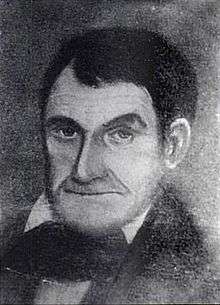Owen Brown (abolitionist, born 1771)
Owen Brown (February 16, 1771 – May 8, 1856), father of abolitionist John Brown, was a wealthy cattle breeder and land speculator who operated a successful tannery in Hudson, Ohio. He was also a stout and outspoken abolitionist and civil servant. Brown was a founder of multiple institutions including the Western Reserve Anti-Slavery Society, Western Reserve College, and the Free Congressional Church. Brown gave speeches advocating the immediate abolition of slavery and facilitated the Underground Railroad.
Owen Brown | |
|---|---|
 | |
| Born | February 16th, 1771 |
| Died | May 8th, 1856 (aged 85) Hudson, Ohio, U.S. |
| Resting place | Old Hudson Township Burying Ground 41.24530°N 81.43920°W |
| Nationality | American |
| Other names | Squire Brown |
| Spouse(s) | Ruth Mills (1793–1808) Sally Root (1809–1840) Lucy Hinsdale (1841–1856) |
| Children | John Brown |
| Relatives | Owen Brown (grandson) |
Early life and education
One of 10 children, Owen Brown was born on February 16, 1771 to Revolutionary War Capt. John Brown (1728–1776) and Hanna Owen Brown, in Torrington, Connecticut. A lifetime admirer of the Founding Fathers, Owen's first memory was of the departure of his father's militia company to engage the British in New York during the summer of 1776.[1]
Later life
A wealthy tanner, cattle breeder, and land speculator, Brown was a dedicated civil servant and was integral to the early growth of Hudson, Ohio.[2] Famed for his resourcefulness and energy, he was known locally as Squire Brown.[3] Brown served in a multitude of positions in the community including County Commissioner and Justice of the Peace.[4] Owen was deeply rooted in the abolitionist movement. He was personal friends with leaders such as Frederick Douglass who often stayed with the Brown family when he was lecturing in the area.[5] Owen, in collaboration with David Hudson was integral in establishing one of the earliest way stations along the Underground Railroad and personally arranged passage into Canada for many escaped slaves.[6][7]
Colleges
Owen was a founding trustee of Western Reserve College and is credited for securing its location in Hudson as well as overseeing the construction of its first building.[8][9][10][11] During Brown's tenure (1825-1835), Western Reserve College became known as a hotbed of abolitionist ideals.[12] After the death of the institution's first president, Charles Backus Storrs, in 1833 the university elected a more conservative president, George E. Pierce in an attempt to distance itself from the politics of slavery.[13][14] In 1835 Brown resigned his position and joined a large contingency of faculty, staff, and students of Western Reserve College who moved to Oberlin Collegiate Institute (now Oberlin College) in Oberlin, Ohio, where he served as trustee from 1835 to 1844. Brown and others were successful in making Oberlin the first institution of higher learning to admit women and one of the first to admit black students. Owen's own daughter, Florella Brown, studied at Oberlin from 1835-1839, where she met her husband, Samuel Lyle Adair.[15]
Death and burial
Brown died in Hudson on May 8, 1856.[16] He was buried at Old Hudson Township Burying Ground in Hudson.[17]
See also
References
- Carlton, 22
- Carlton, 23
- Carlton, 23
- Carlton, 23
- Carlton 145
- Carlton 145
- Carlton 30
- Carlton, 23
- Carlton, 73
- Cutler, 13
- Du Bois, 66
- Carlton, 73
- Carlton, 73
- Cutler, 26
- Clayton, John Edward (26 Apr 1990). "An Antislavery Mission: Oberlin College Evangelicals in 'Bleeding Kansas'". Oberlin College. Retrieved 17 Feb 2019.
- "Biographical Details, Owen Brown". Family of Owen Brown. Hudson, OH: Hudson Library and Historical Society. Retrieved June 20, 2018.
- "Biographical Details, Owen Brown".
Bibliography
- Carlton, Evan (2006). Patriotic Treason: John Brown and the Soul of America. New York, NY: Free Press. ISBN 0-7432-7136-X.
- Cutler, Carroll (1876). "A History of Western Reserve College During its First Half Century 1826-1876." Cleveland, OH: Crocker's Publishing House.
- Du Bois, W.E.B.(1972). "John Brown." New York, NY: International Publishers. ISBN 0-7178-0375-9.
External links
| Wikimedia Commons has media related to Owen Brown (abolitionist, born 1771). |